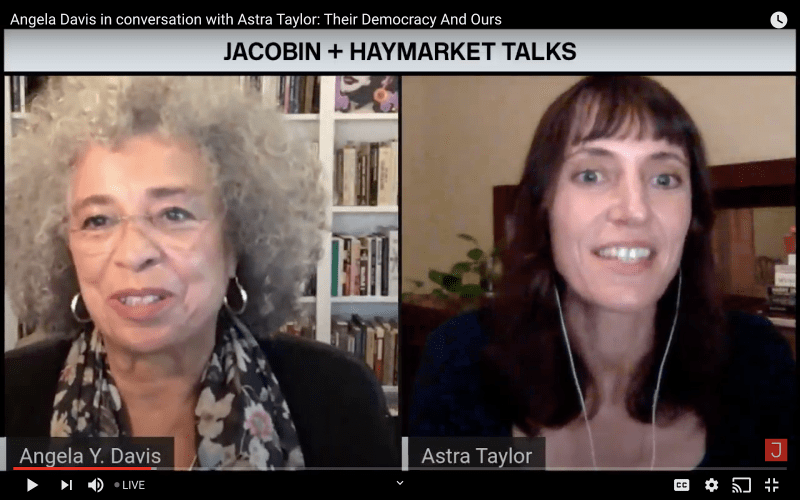Political activist Angela Davis and filmmaker Astra Taylor said calls for prison abolition must incorporate analyses of capitalism and democracy in an event called “Their Democracy and Ours” on Tuesday.
Inspired by Taylor’s award-winning film — “What is Democracy?” — about building democracy in an unjust world, the conversation drew thousands of viewers to hear the perspectives of Davis, a professor emerita at the University of California, Santa Cruz who is known for her work on prison abolition, feminism and anti-capitalism.
The event was organized by comparative literature professor David Palumbo-Liu, who partnered with democratic socialist publication Jacobin Magazine and non-profit publisher Haymarket Books. Though originally planned to be physically held at Stanford, the event was broadcast live on Jacobin’s YouTube channel.
“More than a year ago, a class I teach at Stanford called ‘Scholarship and Activism’ organized this event and we very much wanted to hear from Astra Taylor after watching her film, and also have Angela Davis on stage with her to exchange ideas,” Palumbo-Liu said in his introduction.
Contributing to the current political discourse around abolition, Davis discussed and criticized widely held notions of democracy and oppression.
“So many struggles have been about bringing the marginalized into the fold of the democracy, and that is where we make many mistakes,” she said. “W.E.B. DuBois argued that democracy could not remain the same and respond to the needs of those who had been previously enslaved. The democracy itself would have to be transformed, and new institutions would have to be created.”
“We are now preparing to do work which should have happened over 150 years ago,” Davis added.
She further said that imprisonment is inextricable from capitalism and democracy because “imprisonment entails the divestment of rights,” which would not make sense “in a society that did not recognize individual rights.”
Extending Davis’ argument to the upcoming presidential election, Taylor said it was important not just to vote, but also to try to change the electoral system to be more equitable.
“We are frustrated by presidential elections every four years, but I think in the rest of the time we do need to think about reforms that will change the rules of the game, like ranked-choice voting or ways to actually transform the system instead of just thinking about participation,” Taylor said.
Davis and Taylor also discussed the relationship between democracy and economic systems. According to Taylor, America is becoming more explicitly anti-democratic in its reliance on “minoritarian” institutions like the Electoral College.
“It is important to consider the ways in which economic transformations have a direct impact on possibilities for democracy,” Davis said.
Drawing attention to America’s founding, Taylor pointed out the contradictions she saw in establishing a democracy within a slave-owning country. According to her, because America was “founded on the enslavement of African peoples and the attempted genocide of indigenous peoples,” our democracy has always been “twinned with imperial conquest, with exclusion, with exploitation.”
Taylor and Davis also touched on the temporality of democracy and the complex ways in which past or future generations can influence the present. Taylor criticized how the Constitution allowed the Founding Fathers to keep “their hands reaching up from beyond the grave” and pushed the audience to think about expanding democracy “to include future generations” by ensuring that the planet, and American democracy, is habitable for them.
Bringing a feminist analysis into their conversation, Taylor and Davis examined how the movement for gender equality and liberation intersects with abolition. Davis envisioned a society in which “we did not have to assume that the institutions of policing and imprisonment were there to pretend to solve the problem of [gender violence]” and how it could push people to take a “more complex approach.”
“I’m talking about a feminism that is anti-racist, that is anti-capitalist, that is not just what we used to call ‘bourgeois white feminism,’” she emphasized.
Davis and Taylor closed by explaining how leftist and radical movements can build democracy within their interpersonal relationships as well.
“Mentorship has to be egalitarian,” Davis said. “This is one of the ways in which we can enact democratic relationships in the course of struggling for change.”
She provided an example of her work with Critical Resistance, an organization that encourages incarcerated people to hold leadership positions and speak on panels about their experiences.
“It was amazing to feel as if we were in community with those who were locked up inside, and we were willing to take their leadership, and their ideas would be given equal weight as the ideas of a Stanford University senior professor.”
Contact Jessica Zhu at jesszhu ‘at’ stanford.edu.
